Starr Sackstein is Director of Humanities K-12 in West Hempstead Union Free School District in New York. She is Social Media Manager of ECET2 and manages the Twitter account to build the brand as the voice of @ECET2natl. She is the author of several books on education, on topics such as going gradeless, peer feedback and blogging.
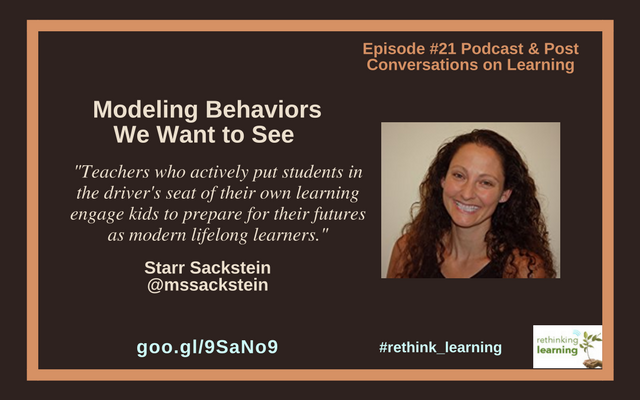
Podcast: Play in new window | Download
I met Starr on Twitter years ago and learned more about her through reading several of her books. She moderated a chat, wrote a blog on the Power of Questions, and even wrote a section for both of my books. I really was honored that Starr was able to take time to have a conversation with me and I learned so much more about her. Here are a few excerpts from our conversation below:
Can you share your story about you, your son, and being a teacher?
I have been in education for 16 years and it has been a learning adventure every day. I’m super proud to be a teacher and educator. This is the first year that I’m an administrator. Being a school leader is very different than being a teacher in the classroom. I miss my kids every day. I’m just hoping that the transition is one that is smooth and that I begin to love working with teachers the same way I love working with kids.
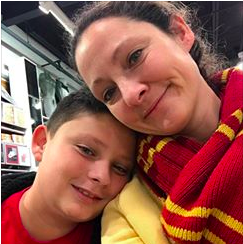
Even though I am a central district person now, I am housed in the high school and around kids in the building and get to stop into classrooms to see what is going on. That’s my favorite part of every day. If there is anything that is a big change for teachers such as student-centered classrooms, or if they are going to take a risk with something, I’ve offered my services to support them in their classrooms. I’m back in grad school getting an advanced certification in education administration. My son just started middle school and is in 7th grade.
What are your job and responsibilities now?
I am responsible for several K-12 departments: English, Social Studies, World Language, and Business departments. Instead of keeping them as separate departments, the idea is to create one Humanities Department and the idea is to start with one interdisciplinary unit so kids can make those connections more concretely as they are learning. Hopefully, the ultimate goal is the shift to a project-based atmosphere where teachers are collaborating so the kids get those benefits of the collaborations. A lot of these ideas are new so it is going to be new for many of the teachers and students. We plan to take baby steps. I hope I can get them to think in terms of student-centered learning first before I start to really integrate the bigger steps of getting the more integrated content area. Especially in the high school where there are so many exams that they have to adhere to still. That’s going to be a challenge for a lot of the teachers.
My district knows my background with gradeless classrooms, assessment, and ideas about homework. When I got hired, they knew about my books and my focus. The district is very traditional. When I have independent conversations with people and we talk about assessment, I usually drop it in a little bit. We do have a very large ELL population at the school so homework seems less of an issue because they don’t have the support they need at home anyway. A lot of teachers aren’t giving homework, and the ones that are, are going to be encouraged to do a little less of that especially on the middle and high school level. They have started talking about changing the report cards in the elementary schools to be more standards-based. New York state just changed their standards so we’re waiting until those standards are available. Then we can start the process.
How do you balance your life, your work, and writing?
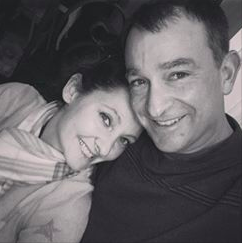 I am not really good at balancing my life. I got engaged this summer. Basically, having someone I want to spend time with at home aside from my son forces me to shut the books once in a while and put my phone aside. I’m hoping to put clear lines between work and home. I had some real vacations this summer, too where I wasn’t working at all. I really enjoyed that time and being off the grid. I think I’m going to try that more.
I am not really good at balancing my life. I got engaged this summer. Basically, having someone I want to spend time with at home aside from my son forces me to shut the books once in a while and put my phone aside. I’m hoping to put clear lines between work and home. I had some real vacations this summer, too where I wasn’t working at all. I really enjoyed that time and being off the grid. I think I’m going to try that more.
A Recovering Perfectionist Journey to Give Up Grades.
Public speaking is a real challenge because I’m almost painfully shy. Over the years, I’ve gotten better at it, but I still feel like I’m going to throw up in front of people. I’m really passionate about what I’m talking about. I tried to prepare super hard for it. I felt it was important to share the story about assessment. Once I get over that initial fear of getting in front of a crowd of people, it kind of alleviates. With the TedTalk, ironically it was a 12-minute talk and by minute 7 I started feeling comfortable. I actually felt like it wasn’t that bad at that moment and then it was over. I just wanted to share my story and thought it was important for people to think about assessment.
Let’s talk about your book: Peer Feedback in the Classroom: How does peer feedback play a powerful role in learning and teaching?
When we are teaching kids to give each other feedback, there’s a really important role not only of being the receiver of feedback and learning to use that in a positive and integral way to make them better learners. It is also for them to provide really good feedback to teach them to identify ideas for them to start giving really good actionable feedback to their peers. This is better so teachers are not the only ones responsible for making sure that every kid gets feedback every day. I put in the book the culture you need to cultivate in your space so that peer feedback can happen. It breaks down how to model the behaviors kids are going to need to emulate and how to create expert groups. This was how I ran peer workshops in my class. It also talks about how to make them endure over time. and encouraging peer expert groups and using them in classrooms for different things.
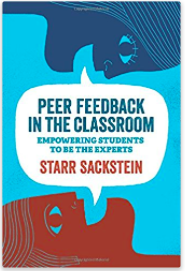 In the faculty meetings, I will be leading in the department, I plan to model the behaviors I hope to see them use in class, differentiating, giving good collaboration time, not speaking too much in front of the space. I’m hoping to see some peer expert groups happening in those department meetings so that may be the entryway to show them that they can do this with their kids too. I know you asked about giving teachers my books, but I’m uncomfortable being self-promotional in handing my book to teachers. I have a library in the office with many books including mine.
In the faculty meetings, I will be leading in the department, I plan to model the behaviors I hope to see them use in class, differentiating, giving good collaboration time, not speaking too much in front of the space. I’m hoping to see some peer expert groups happening in those department meetings so that may be the entryway to show them that they can do this with their kids too. I know you asked about giving teachers my books, but I’m uncomfortable being self-promotional in handing my book to teachers. I have a library in the office with many books including mine.
Now let’s discuss Hacking Homework that you wrote with Connie Hamilton: Why is the homework debate ending?
There are a lot of folks stuck in the same regime, and I feel homework falls into that category. People who will say that kids need homework to be more responsible or be held accountable, there’s really no research out there especially at the primary level that suggests that homework does anything to promote learning. In fact, in those formative years, kids need to be playing more and engaging in their environment. If we do certain things in our spaces, we won’t have to send homework home. There is so much discrepancy with the type of support kids have at home. If you are in a district that isn’t a high socio-economic district, you’re going to end up with kids whose parents are working all the time or speak a different language, there’s a gap in the support they can get.
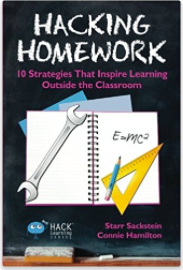 Where I grew up, my mom used to do all my brother’s homework and his projects. When kids are at home, you just don’t know whose work you’re getting when it comes back and then be crazy enough to assess that work and use that as a part of an agreed-upon assessment for all kids. Maybe by the time kids get to high school, you can assign work that gets done over a period of time, and then the kids have to map out when it’s good for them to do it. Regular daily nightly homework is really a waste of time in my opinion.
Where I grew up, my mom used to do all my brother’s homework and his projects. When kids are at home, you just don’t know whose work you’re getting when it comes back and then be crazy enough to assess that work and use that as a part of an agreed-upon assessment for all kids. Maybe by the time kids get to high school, you can assign work that gets done over a period of time, and then the kids have to map out when it’s good for them to do it. Regular daily nightly homework is really a waste of time in my opinion.
Maybe learning needs to be anywhere and everywhere. What do you think?
Absolutely! I think kids don’t recognize the stuff they’re doing outside of their own spaces is educational. It’s just about making them aware of the fact that there is mathematics that go into those kinds of things like if they’re cooking with their mom for dinner, doing laundry, working on measuring with fractions. Consider if they’re doing a load of laundry and have to figure out what time or how much of the detergent to put in or even reading directions so they don’t ruin something expensive. That’s math!
If they’re outside exploring, playing in the dirt, picking up rocks or participating in sports and games and all these things that kids do the imaginative play that happens between friends outside helps them become better learners and better people. I think we have to broaden our ideas of what learning is outside and inside of a school so that you know we’re not just looking at those worksheets which or an atrocious waste of time and ruins the environment.
What are your next steps, books, and projects?
Mark Barnes who publishes the Hacking Education series is definitely trying to get me to do a second hacking assessment book that goes a little deeper. I went to Canada to work with a K-12 district that this going great. I would love to do a case study about what that looks like over time. I did write a pitch to my other publisher because I owe them another title at some point. We talked about doing a student voice book but not until 2019. I have way too much going on right now in my primary job and I’m taking a current issues class right now on top of everything else so I have to write 20 pages long paper.
I’m still hosting and moderating a Twitter group #T2T with Mark Barnes that came out on the heels of teachers throwing out grades. I feel like it’s really bringing a lot of legitimacy to this idea that learning doesn’t need to be labeled for it to be real learning. Honestly, the message doesn’t have to come from me for it to be good. If educators reach out to me on Twitter, I am very eager to help and be supportive in whatever way that I can. I’ll still be doing keynotes when the opportunities arise and consulting work with groups who are really serious about making these changes. I’m always interested in collaboration and learning from other people also and you know I always have time to answer people’s questions so if they have questions, they can always reach out to me.
****
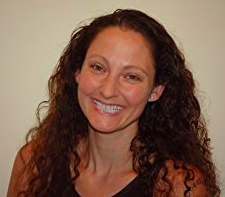 Starr Sackstein is an author, mom, NBCT, TedX speaker, and 2016 ASCD Emerging Leader and blogger. She is Director of Humanities K-12 in West Hempstead Union Free School District in New York. Starr is the Social Media Manager of ECET2 and manages the Twitter account to build the brand as the voice of @ECET2natl. She is the author of several books on education, on topics such as going gradeless, peer feedback, and blogging. She was a high school English and Journalism teacher at World Journalism Preparatory School in Flushing, NY where her learners ran a multi-media news outlet at WJPSnews.com. Starr serves as the New York State Director to JEA to help serve advisers in New York better grow journalism programs.
Starr Sackstein is an author, mom, NBCT, TedX speaker, and 2016 ASCD Emerging Leader and blogger. She is Director of Humanities K-12 in West Hempstead Union Free School District in New York. Starr is the Social Media Manager of ECET2 and manages the Twitter account to build the brand as the voice of @ECET2natl. She is the author of several books on education, on topics such as going gradeless, peer feedback, and blogging. She was a high school English and Journalism teacher at World Journalism Preparatory School in Flushing, NY where her learners ran a multi-media news outlet at WJPSnews.com. Starr serves as the New York State Director to JEA to help serve advisers in New York better grow journalism programs.
She blogs on Education Week Teacher at “Work in Progress” in addition to her personal blog StarrSackstein.com where she discusses all aspects of being a teacher and education reform. Sackstein co-moderates #sunchat as well as contributes to #NYedChat.
Starr’s Contact information:
Email: mssackstein@gmail.com
Twitter: @MsSackstein
LinkedIn: starrsackstein
Facebook: Starr Sackstein, MJE Facebook Fan page
Starr has authored the following books:
Hacking Homework:10 Strategies That Inspire Learning Outside the Classroom, Teaching Mythology Exposed: Helping Teachers Create Visionary Classroom Perspective, Blogging for Educators, Teaching Students to Self Assess: How do I help Students grow as learners?, Hacking Assessment: 10 Ways to Go Gradeless in a Traditional Grades School and The Power of Questioning: Opening up the World of Student Inquiry
Starr Sackstein, NBCT
Director of Humanities k-12, West Hempstead Union Free School District
My TEDx Talk – A Recovering Perfectionist
Education Week Teacher: Work in Progress
Amazon Author page
ASCD Emerging Leader 2016
Amazon Teacher Innovator
One of 2016’s top educators to watch
Bammy Finalist 2014 (high school teacher) and 2015 (educational blogger/commentator)
Google Educator
Special Recognition Adviser by the Dow Jones News Fund 2011
ASNE Fellow – Kent State ’11
*****
For all of the Rethinking Learning podcasts with Barbara Bray, click on the podcast tab at the top, the logo below, or go to https://barbarabray.net/podcasts/
Go to this page for resources, questions, and more information about Barbara’s new book, Define Your WHY.







